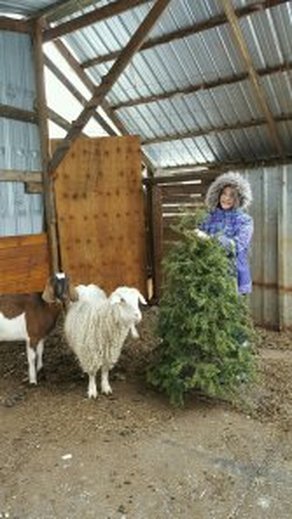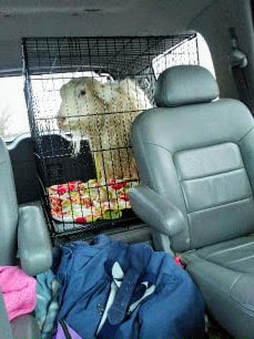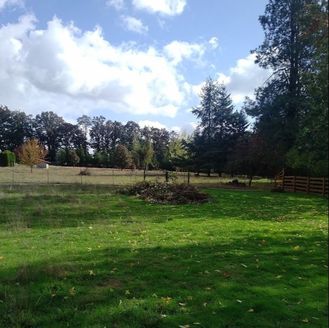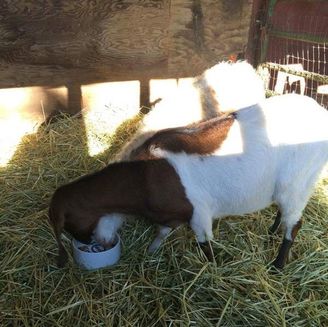|
It is amazing how "not knowing what you don't know" makes you brave enough to do things you would never otherwise do, or at least not without a lot more planning. We first got goats right after moving into a rental property. I had dreamed of goats for years, and we were all so excited! At the time it was late December and it is not a time of year that a lot of livestock is being sold, so I knew I was lucky when I found Petunia for sale. She came with Vanilli, the white "sheep" goat (Pygora), and our adventure into goats was born. We built some pens in the back of Josh’s work van which at the time was a 15 passenger van with the back seats out, and drove 1 ½ hrs to pick them up.  Feeding the goats our christmas tree a few days after getting them. Feeding the goats our christmas tree a few days after getting them. I let the kids take them on leads and walk them around in the field to get used to the space. The first day was great. The second day, I got a frantic phone call from Josh at work (it was naturally a Sunday) that the goats were terribly ill and he wasn’t sure they would live. Naturally, having owned goats for less than 72 hours, I wasn’t about to let them die. I had him call the emergency vet for a farm visit. Over the course of the next 3 days, we got an education about Rhododendron poisoning and goats. Petunia pulled out of it fairly quickly, but by the second day I could not get Vanilli up without a lot of prodding. He was laying there with his eyes half open, foaming at the mouth, intermittently attempting to vomit/dry heave, and grinding his teeth. He was nearly at death’s door.  Coming home after spending the night at the vet Coming home after spending the night at the vet Frantic, the kids and I managed to get him into the back of our SUV and take him to the vet where was admitted to the veterinary hospital for overnight treatment. I do think he would have died otherwise. $1500 poorer, and wiser, we found the offending rhododendron in the burn pile that had been left in the field by the previous tenants. In the pouring rain we worked to get all of it burned out. After that, we were very invested in goats. Here is 7 things I learned from this experience:
2. Know the poisonous plants in your area. Not all plants are poisonous to all animals. Know the difference and what is common in your area. Believe me, an ounce of prevention is worth a pound of cure. Your animals and your pocket book will thank you. 3. Keep your vet on speed dial. Not all vets are knowledgeable about goats. A lot of vets lump them in with other ruminants, when there are some significant key differences in goats. A good vet is an invaluable resource. Our vet office has 2 doctors who are knowledgeable about goats. They have helped us several times. Develop a repoire with your vet. If you don’t have any good goat vets in your area, there are educational Facebook pages you can join as well as tons of info on the internet, but none of that makes up for having a good vet on your team. 4. Keep emergency medical supplies on hand and know how to use them. If I had activated charcoal and milk of magnesia, and the knowledge of how to tube and drench goats, we may have been able to treat this issue at least in 1 of the goats without expensive vet bills. The best recipe I have seen for poisoning is 1 table spoon of activated charcoal mixed into a slurry and drenched. Then in about an hour, give milk of magnesia. Repeat every 4 hours until improved.  5. Goats, like all living things, need to keep their electrolytes in balance and some molasses water with electrolytes and b vitamins can help this, but equally importantly, goats need to keep their rumens going, otherwise they may suffer acidosis and die. A goat primarily needs good probiotic bacteria (we use this one) long stemmed grass hay, and healthy browse like blackberry stems/leaves, in order to keep their rumen healthy. Our vet advised we continue to offer free choice hay, but not offer any other feed, grain, or alfalfa. 6. Pain control is paramount. If we had not treated the pain, I believe Vanilli and possibly Petunia too may have died. Goats don’t do pain (or water, but that is a story for a different day). Pain can cause rumen shut down, which is life threatening in a goat. Thankfully the doctor gave me some doses of banamine, a pain medicine to give which helped considerably.  7. Don’t kick yourself. Goats are like two year old human kids. They are constantly into everything. If there is a thing that is bad for them to eat, they will find it. If there is a way to escape they will also find that. Even if you do everything right, you may still end up with a sick goat. Things happen. This is how we learn.
0 Comments
|
AuthorWrite something about yourself. No need to be fancy, just an overview. Archives
September 2020
Categories |
 RSS Feed
RSS Feed